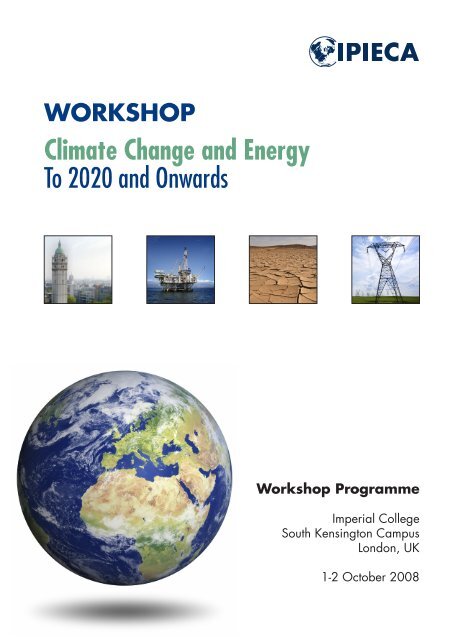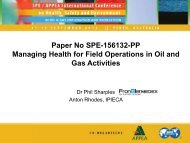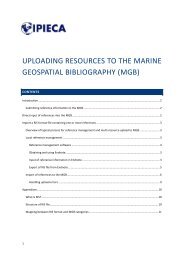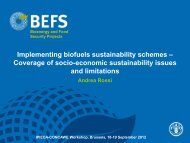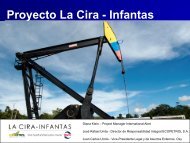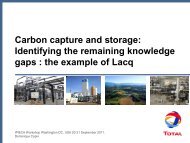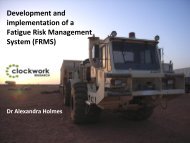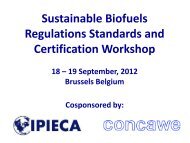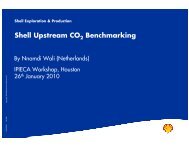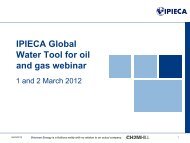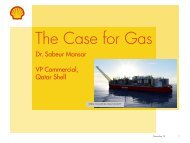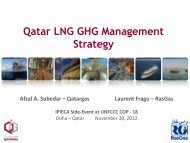Programme - IPIECA
Programme - IPIECA
Programme - IPIECA
Create successful ePaper yourself
Turn your PDF publications into a flip-book with our unique Google optimized e-Paper software.
WORKSHOP<br />
Climate Change and Energy<br />
To 2020 and Onwards<br />
Workshop <strong>Programme</strong><br />
Imperial College<br />
South Kensington Campus<br />
London, UK<br />
1-2 October 2008
Workshop Taskforce<br />
Haroon Kheshgi, ExxonMobil (CCWG and Workshop Taskforce Chair)<br />
David Hone, Shell<br />
Arthur Lee, Chevron<br />
Monica Linhares, Petrobras<br />
Brigitte Poot, Total<br />
John Shinn, Chevron<br />
Bill Thompson, BP<br />
Rob Siveter, <strong>IPIECA</strong> (Project Manager)
Climate Change and Energy<br />
To 2020 and Onwards<br />
Over the coming decades, energy demand will grow significantly, requiring large investments in energy and<br />
strong improvement in energy efficiency all while managing risks associated with greenhouse gas mitigation<br />
and changes in climate and associated adaptation. Policies that aim at significant reductions in greenhouse<br />
gas emissions by 2020 would imply drastic changes in the supply and use of energy – with different changes<br />
in different regions – and raise critical questions for industry.<br />
This workshop will bring together experts from academia, business, governments, and international and<br />
nongovernmental organisations to consider the outlook for greenhouse gas emissions and climate over the<br />
coming decades, policies being developed and implemented over this timeframe, and to explore strategies and<br />
best practice for managing risks.<br />
The workshop, considering primarily the next decade or two, will focus on:<br />
• the outlook of greenhouse gas emissions<br />
• the challenges and opportunities for energy efficiency improvement<br />
• the impacts of, and adaptation to, climate change and variability<br />
• imminent policies and implications<br />
• and the role of actions taken in the near term in relation to the management of the long-term risks of<br />
global climate change<br />
The workshop will conclude with a panel on the implications for business in an environment where climate<br />
change policies differ from nation to nation, with differing national priorities and circumstances.<br />
Climate Change and Energy: To 2020 Onwards •
Agenda – Day 1 1 October 2008<br />
08:30 Registration and refreshments<br />
09:00 Welcome Richard Sykes (<strong>IPIECA</strong>, Executive Secretary)<br />
09:10 Workshop Scene Set Haroon Kheshgi (ExxonMobil, Workshop Chair)<br />
Session 1: Greenhouse Gas Emissions Outlooks and Scenarios<br />
– Chair, Haroon Kheshgi (ExxonMobil)<br />
Efforts to reconcile society’s growing demand for energy while promoting efforts to mitigate the risk of climate change<br />
pose a fundamental challenge. Large investments are needed to continue energy supply to satisfy energy demand<br />
in a world of both strong economic growth and vastly differing circumstances and priorities. Limiting greenhouse<br />
gas emissions while satisfying energy demand entails even larger investments over decades. This session examines<br />
outlooks for greenhouse gas emissions and energy over the next decades, and their implications for climate policy and<br />
investment in energy systems.<br />
09:20 Greenhouse Gas Emissions Outlooks and<br />
Scenarios<br />
Dolf Gielen (IEA)<br />
09:50 Discussion<br />
10:10 Break<br />
Session 2: Improving Energy Efficiency<br />
– Chair, Arthur Lee (Chevron)<br />
The reduction of energy demand contributes, perhaps, the largest potential for the near-term reduction of CO 2<br />
emissions<br />
associated with energy use. Demand reduction can result from more efficient use of energy, choices to use energy for<br />
different purposes, or simply doing without energy services – commonly considered an undesirable outcome. It is well<br />
known that there is both significant technical potential, and numerous barriers to efficiency improvement. This session<br />
will size up the challenges and opportunities for efficiency improvement over the next decade, consider the effect of<br />
efficiency on the energy system and overall energy demand, and focus on issues related to buildings, industry, and<br />
road transport.<br />
10:30 The potential of energy efficiency Jim Sweeney (Stanford University)<br />
11:00 Energy efficiency in buildings Diana Ürge-Vorsatz (Central European University)<br />
11:30 Greenhouse gases and efficiency in industry Dolf Gielen (IEA)<br />
12:00 Road transport and efficiency David Greene (Oak Ridge National Lab)<br />
12:30 Discussion<br />
13:00 Lunch<br />
• <strong>IPIECA</strong>
Session 3: Impacts and Adaptation<br />
– Chair, Monica Linhares (Petrobras)<br />
Over the next few decades, climate variability and change is expected to proceed irrespective of efforts to mitigate<br />
greenhouse gas emissions. Adaptation strategies that reduce vulnerability to a host of risks, including those from<br />
climate change, may hold particular promise. This session will review the state of science in forecasting climate over<br />
the next decades, the consequent risks to society and ecosystems, and the priorities for adaptation to be acted upon.<br />
14:00 Climate forecasting Richard Betts (Hadley Centre, UK Met Office)<br />
14:30 Adaptation Priorities and Climate Change<br />
Impacts<br />
Martin Parry (University of East Anglia)<br />
15:00 Discussion<br />
15:15 Break<br />
15:45 Adaptation Priorities and Socioeconomic<br />
Considerations<br />
Richard Tol (Economic and Social Research Institute)<br />
16:15 Assessing Climate Risks Robert Muir-Wood (Risk Management Solutions)<br />
16:45 Discussion<br />
17:00 Close<br />
18:00 Workshop dinner The Rembrandt Hotel, 11 Thurloe Place, SW7 2RS<br />
Agenda – Day 2 2 October 2008<br />
08:30 Registration and refreshments<br />
Session 4: Imminent Policies and Implications<br />
– Chair, Bill Thompson (BP)<br />
Policies that aim at significant reductions in greenhouse gas emissions by 2020 would imply drastic changes in the<br />
supply and use of energy. The effects of such policies hinge on their impacts on the decisions that are continually being<br />
made -- ranging from the preferences of individuals to the investments of firms. This session will survey the landscape<br />
of imminent policies to address greenhouse gas emissions, explore what this would mean for infrastructure and<br />
investment for energy supply, and consider the implications for the competitiveness of businesses and the effectiveness<br />
of policies in a world where a mosaic of national and regional policies have emerged.<br />
09:00 EU policies and positions Felix Matthes (Oko Institute for applied ecology)<br />
09:30 U.S. Climate Policies in the Near Term Henry Jacoby (Massachusetts Institute of Technology)<br />
10:00 Discussion<br />
10:15 Break<br />
10:45 Competitiveness and carbon leakage Karsten Neuhoff (Cambridge University)<br />
11:15 Implications for energy supply and infrastructure Gordon MacKerron (SPRU)<br />
11:45 Discussion<br />
12:00 Lunch<br />
Climate Change and Energy: To 2020 Onwards •
Session 5: Setting the Stage for the Long-term<br />
– Chair, Brigitte Poot (Total)<br />
Near-term actions alone cannot address the long-term, global challenges and risks of climate change. Addressing<br />
them effectively requires actions and policy frameworks that: promote the more rapid dissemination and use of<br />
efficient, existing commercial technology in both developed and developing countries; encourage the development<br />
and widespread global use of innovative, currently non-commercial technologies; and enhance the ability of all<br />
countries to acquire and utilize advanced technologies. This session will consider scenarios for, and the realities of,<br />
the evolution of both technologies and policies that put near-term actions in the context of long-term objectives. And<br />
this session will focus specifically on CO 2<br />
Capture and Storage (CCS) and biofuels -- two potentially large long-term<br />
contributors to low-emission energy supply.<br />
13:00 Transition scenarios Jae Edmonds (Pacific Northwest National Laboratory)<br />
13:30 International policy framework Nick Campbell (Arkema)<br />
14:00 CCS assessment and initiatives Heleen de Coninck (Energy Research Centre)<br />
14:30 Biofuels Jan-Maarten Teuben (Shell, Chair <strong>IPIECA</strong> Biofuels TF)<br />
15:00 Discussion<br />
15:30 Break<br />
Session 6 Panel Discussion: Effective Policies for Meeting the Climate-Energy Challenge<br />
– Chair, John Shinn (Chevron)<br />
How will society best manage the disaggregated network of climate policies, the evolving geography of energy supply<br />
and demand, and differing national priorities and circumstances, to lead to effective decisions ranging from the<br />
preferences of individuals to the investments of firms? This panel draws on participants from this workshop to address<br />
this broad question.<br />
16:00 Panel Discussion<br />
• Consequences of climate policies<br />
• Investment and climate change policy<br />
• Managing risks to competitiveness<br />
Henry Jacoby (MIT); Nick Campbell (Arkema);<br />
Steven Fries (Shell)<br />
17:00 Close Haroon Kheshgi (ExxonMobil, Chair CCWG)<br />
• <strong>IPIECA</strong>
Speaker Biographies<br />
Dr Richard Betts<br />
Dr Richard Betts is Head of Climate Impacts at the Met Office Hadley Centre, which is the UK Government research<br />
centre on climate. He leads a team of research scientists, operational forecasters and consultants in understanding and<br />
predicting the impacts of natural climate variability and anthropogenic climate change, for a wide range of customers<br />
both in government and the private sector. He has a Bachelor’s degree in Physics and a Master’s in Meteorology and<br />
Climatology, and his PhD thesis examined the role of the world’s ecosystems in climate change. He has worked as a<br />
climate modeller for 15 years, and has pioneered a number of key developments in the extension of climate models to<br />
include biological processes. He has published over 50 peer-reviewed scientific papers and other articles.<br />
Richard was a lead author on the Fourth Assessment Report of the Intergovernmental Panel on Climate Change (IPCC),<br />
which shared the 2007 Nobel Peace Prize with former US Vice President Al Gore. He was also a lead author on the<br />
Millennium Ecosystem Assessment, the authors which shared the 2005 Zayed Environment Prize with the UN Secretary-<br />
General Kofi Annan. Richard is a member of the editorial board of the International Journal of Global Warming. Richard<br />
was a leading peer-reviewer of the Stern Review of the Economics of Climate Change, and has previously served on the<br />
Global Analysis, Integration and Modelling (GAIM) steering group of the International Geosphere-Biosphere <strong>Programme</strong><br />
(IGBP), and on the World Meteorological Organisation’s Expert Team on the impacts of agriculture on climate.<br />
Dr Nick Campbell<br />
Nick has spent 20 years working primarily on the ozone issue and climate change. He works for ARKEMA SA, based<br />
in Paris, as the Environment Manager for the Fluorinated Products Division. In the Climate Change area, Nick has been<br />
involved in the international discussions since 1991 and has attended all the working groups meetings leading to the<br />
Kyoto Protocol as well as all the conferences of the Climate Change Convention and its Subsidiary Bodies. He has acted as<br />
a Coordinating Lead Author for the IPCC/TEAP joint Report on HFCs and PFCs (April, 2005), was an author of a section<br />
of the IPCC ‘Good Practice Guidance and Uncertainty Management in National Greenhouse Gas Inventories’ and has<br />
acted as an Expert Reviewer for the Working Group 3 and Synthesis Reports of the IPCC 4th Assessment Report.<br />
Nick is Chairman of the BusinessEurope (formerly UNICE) Climate Change Working group, representing EU Employers’<br />
federations; he is also the Chairman of the European Chemical Industry Council (CEFIC) Task Force on Climate Change.<br />
Nick is the Chairman of the International Chamber of Commerce (ICC) Working Party on Climate Change and has led<br />
this group at COP-6 in The Hague and subsequent COPs. He is deeply involved in both discussions concerning the EU<br />
Emissions Trading Scheme and its review and has recently been an active member of the European Climate Change<br />
<strong>Programme</strong> Working Group on the EU ETS review. He is also actively involved in the issues around the post-2012<br />
discussions and has given many presentations on both this issue and the EU ETS. Nick was awarded a 1997 United States<br />
EPA Stratospheric Ozone Protection Award for his role in the phase-out of ozone depleting substances.<br />
Heleen de Coninck<br />
Ms. Heleen de Coninck works as a manager of the International Energy and Climate group at ECN Policy Studies. Her<br />
main focus of work is international climate policy and technology, particularly CO 2<br />
capture and storage. Heleen worked<br />
on a number of aspects of energy and climate policy: post-2012 climate issues, the Clean Development Mechanism, CO 2<br />
capture and storage, and policy interactions in climate policy. She is one of the editors of the IPCC Special Report on<br />
Carbon dioxide Capture and Storage and has been involved in a number of other projects in the field of CCS. Among<br />
others, she worked as a consultant in the field of CCS and CDM for the UNFCCC, led the project leading to the integration<br />
of CCS in the EU ETS and the Directive on Geological Storage of CO 2<br />
for the European Commission, and worked on the<br />
ACCSEPT project on social, economic and regulatory barriers to CCS.<br />
Climate Change and Energy: To 2020 Onwards •
Dr Jae Edmonds<br />
Jae Edmonds is a Chief Scientist and Laboratory Fellow at the Pacific Northwest National Laboratory’s (PNNL) Joint<br />
Global Change Research Institute, and Adjunct Professor of Public Policy at the University of Maryland at College Park.<br />
Dr. Edmonds is the principal investigator for the Global Energy Technology Strategy Program to Address Climate Change,<br />
an international, public-private research collaboration. His research in the areas of long-term, global, energy, economy,<br />
and climate change spans three decades, during which time he published several books, numerous scientific papers and<br />
made countless presentations. His most recent book, “Global Energy Technology Strategy, Addressing Climate Change”,<br />
distils more than a decade of research on the role of technology in addressing climate change. Dr. Edmonds has served in<br />
the capacity of Lead Author on every major IPCC assessment to date and presently serves on the IPCC Steering Committee<br />
on “New Integrated Scenarios”. He serves on numerous panels and advisory boards related to energy, technology, the<br />
economy and climate change. His received his Ph.D. in the field of Economics from Duke University in 1975.<br />
Dr Steven Fries<br />
Steven Fries took up the position of Chief Economist of Royal Dutch Shell plc in July 2006, where he is responsible for<br />
advising the group on global economic developments and on economic policy issues that affect its operations and strategy.<br />
He also holds a visiting professorship in the Department of Economics at the University of Oxford and a William Golding<br />
Senior Fellowship at Brasenose College, Oxford. Prior to joining Royal Dutch Shell plc, he was Deputy Chief Economist<br />
and Acting Chief Economist at the European Bank for Reconstruction and Development. Dr. Fries began his professional<br />
career as an economist at the International Monetary Fund. He earned a D.Phil. in Economics at the University of Oxford<br />
after receiving a B.Sc. in economics from the Wharton School of the University of Pennsylvania. Dr. Fries has published<br />
extensively on the post-communist economic transition in Eastern Europe and on financial reform and development.<br />
Dr Dolf Gielen<br />
Dolf Gielen is a Senior Analyst working in the Energy Technology Policy Division of the International Energy Agency<br />
in Paris since 2002. He is currently head for the Energy Technology Perspectives project of the Agency. In 2007 he coauthored<br />
Tracking Industrial Energy Use and CO 2<br />
Emissions, an IEA publication in the framework of the G8 Dialogue on<br />
Climate Change, Clean Energy and Sustainable Development.<br />
He received his PhD from Delft University of Technology. From 1992 till 2000 he worked for the Energy Research Centre<br />
of the Netherlands (ECN). From 2000 to 2002 he stayed as a visiting scientist at the Japanese National Institute for<br />
Environmental Sciences (NIES).<br />
Dr David Greene<br />
A Corporate Fellow in Oak Ridge National Laboratory’s Energy and Transportation Science Division, David Greene<br />
has spent 30 years researching transportation energy and environmental policy issues for the federal government. Dr.<br />
Greene has authored or co-authored more than two hundred professional publications, including over seventy-five articles<br />
in refereed journals. He was the first Editor-in-Chief of the Journal of Transportation and Statistics and serves on the<br />
editorial boards of Energy Policy and Transportation Research D. He was a lead author for the Second, Third and Fourth<br />
Assessment Reports of the Intergovernmental Panel on Climate Change and a lead author for the IPCC report on Aviation<br />
and the Global Atmosphere. Dr. Greene earned a B.A. degree from Columbia University in 1971, an M.A. from the<br />
University of Oregon in 1973, and a Ph.D. in Geography and Environmental Engineering from The Johns Hopkins<br />
University in 1978. In recognition of his service to the National Research Council, Dr. Greene was designated a lifetime<br />
National Associate of the U.S. National Academies. A 20-year member of the Society of Automotive Engineers, David<br />
Greene was the recipient of the SAE’s 2007 Barry D. McNutt Award for Excellence in Automotive Policy Analysis.<br />
Professor Henry Jacoby<br />
Henry D. Jacoby is Professor of Management in the M.I.T. Sloan School of Management and Co-Director of the M.I.T.<br />
Joint Program on the Science and Policy of Global Change, which is a world leader in integration of the natural and<br />
social sciences and policy analysis in application to the threat of global climate change. He is director of the design<br />
• <strong>IPIECA</strong>
and application of the social science component of the Joint Program’s Integrated Global System Model – which is a<br />
comprehensive research tool for analyzing potential anthropogenic climate change and its social and environmental<br />
consequences – and he is a leader of M.I.T. research and analysis of national climate policies and the structure of the<br />
international climate regime.<br />
An undergraduate mechanical engineer at the University of Texas at Austin, Professor Jacoby holds a Ph.D. in Economics<br />
from Harvard University where he also served on the faculties of the Department of Economics and the Kennedy School of<br />
Government. He has been Director of the Harvard Environmental Systems Program, Director of the MIT Center for Energy<br />
and Environmental Policy Research, Associate Director of the MIT Energy Laboratory, and Chair of the MIT Faculty. He has<br />
made extensive contributions to the study of economics, policy and management in the areas of energy, natural resources<br />
and environment, writing widely on these topics including seven books. He currently serves on the Scientific Committee of the<br />
International Geosphere-Biosphere Program and of Climate Research Committee of the U.S. National Research Council.<br />
Professor Gordon MacKerron<br />
Gordon MacKerron has been Director, Sussex Energy Group, SPRU (Science and Technology Policy Research), University<br />
of Sussex since April 2005, following four years as Associate Director, NERA Economic Consulting, London and an earlier<br />
career for over 20 years at SPRU. He is an economist specialising in energy and environmental economics, with degrees<br />
in economics from the Universities of Cambridge and Sussex. His academic career has specialized in the economics and<br />
policy issues of electricity and especially nuclear power, in which he has published and broadcast widely.<br />
He has frequently been Specialist Adviser or invited witness before House of Commons Select Committee inquiries on<br />
energy subjects. From June to December 2001 he was on secondment to the PIU, Cabinet Office, as Deputy leader of the<br />
UK Government’s Energy Review team. He has subsequently assisted the UK Department of Trade and Industry (DTI) in its<br />
consultation process leading up to a major Energy White Paper released in February 2003 and subsequently advised DTI<br />
on security of supply and low carbon technology strategies.<br />
Professor MacKerron has also been the expert witness on economic issues for the Irish Government in its two international<br />
court cases on the subject of Sellafield before the Permanent Court of Arbitration in the Hague in 2002 and 2003.<br />
Professor MacKerron chaired the Energy Panel, DTI/OST Technology Foresight <strong>Programme</strong> (1995-98) and since December<br />
2003 has been the Chair of the Committee on Radioactive Waste Management, an independent body charged with<br />
recommending the best approach to long-term radioactive waste management to the UK Government.<br />
Dr Karsten Neuhoff<br />
Karsten Neuhoff originally studied physics at the Universites of Freiburg, Granada, and a Masters from the University<br />
of Heidleburg, then switched to economics with an MSc from the London School of Economics and a doctorate from<br />
the University of Cambridge, England. He is senior research associate at the Faculty of Economics of the University<br />
of Cambridge and is assistant Director of the UK Research Council funded project “Towards a Sustainable Energy<br />
Economy” on Emission and Technology Policy; Project Initiator for the project SUPERGEN on the future of the UK power<br />
system; and project leader for various European Research Projects of www.climatestrategies.org. He is affiliated with<br />
the German Institute for Economic Research, Berlin, and was a visiting scholar at Massachusetts Institute of Technology<br />
in 2004. He has published on electricity market design and regulation, technology policy and emission trading in<br />
academic and policy journals including the RAND Journal, IEEE Transactions on Power System, Energy Economics,<br />
Utilities Policy, Climate Policy and edited and contributed chapters to books. He is writing a book “Tackling Carbon.”<br />
Professor Martin Parry<br />
Dr Parry is Visiting Professor at Imperial College London. He is a Co-Chair of Working of Group II (Impacts and Adaptation)<br />
of the Intergovernmental Panel on Climate Change (IPCC). Formerly he was Professor of Geography at the universities<br />
of Oxford, University College London and Birmingham; and Professor of Environmental Science at the University of East<br />
Anglia. He has published about 140 scientific papers and 5 books on climate change and on land use. His specific<br />
research interests are in climate change impacts and adaptation on agriculture. From 1983-2005 he was editor of<br />
Climate Change and Energy: To 2020 Onwards •
the journal Global Environmental Change. He is a recipient of the Peek Award (1991) from the Royal Geographical<br />
Society (UK), and the Gerbier-Mumm International Award (1993) from the World Meteorological Organisation, both<br />
for contributions to research on climate change. He was appointed OBE in 1998 for services to the environment and to<br />
climate change.<br />
Felix Matthes<br />
Felix is currently a researcher in the Energy & Climate Protection division of the Öko-Institut, and a visiting scientist at<br />
the Massachusetts Institute of Technology (Joint Program on the Science and Policy of Global Change), Cambridge, MA<br />
(USA) in 2008 & 2007. Previously he was Deputy Director of the Öko-Instituts from 2002-2004. Felix has undertaken<br />
numerous studies and publications on German and international energy, environmental and climate policy. Key research<br />
topics during the last years include: Power production from Combined Heat and Power (policy advice for preparation and<br />
monitoring of the German CHP Act), CO 2<br />
emissions trading (numerous contributions to the National Allocation Plan (NAP),<br />
comparison of NAPs, linking of ETS), Regulation of carbon dioxide capture and storage, Energy and emissions projections<br />
, EU energy market development and market liberalization, Assessment of policy tools in energy and environmental<br />
policies, and International climate policy (e.g. national expert for in-depth review missions on national communications<br />
under the UNFCCC on behalf of the UNFCCC secretariat) . He is also a Member of the German branch of the International<br />
Association for Energy Economics, and the German Association of Policy Science as well as being a guest lecturer for<br />
energy policy analysis at Otto-Suhr-Institute for Political Science at the Free University of Berlin.<br />
Dr Robert Muir-Wood<br />
Robert Muir-Wood is the Chief Research Officer of Risk Management Solutions. He has degree in Natural Sciences and<br />
a PhD in Earth Sciences both from Cambridge University. He is the author of many scientific papers on the analysis of<br />
earthquakes, hurricanes and windstorms, more than 150 articles and six books. He has more than 20 years experience<br />
in developing probabilistic catastrophe models, and has led projects to build models for earthquake, tropical cyclone,<br />
windstorm and flood, in Europe, Japan, North America, Caribbean and Australia and has been the technical lead on a<br />
number of Catastrophe risk securitization transactions. He has also lectured widely on catastrophe risk and the business<br />
response to climate change. He was Lead Author on Insurance, Finance and Climate Change for the 2007 4th IPCC<br />
Assessment Report and is Vice Chair of the OECD High Level Advisory Board of the International Network on the Financial<br />
Management of Large Scale Catastrophes.<br />
Professor James Sweeney<br />
Professor James L. Sweeney is Professor of Management Science and Engineering; Senior Fellow of the Stanford Institute<br />
for Economic Policy Research; Senior Fellow of the Hoover Institution; and Senior Fellow of the Freeman Spogli Institute<br />
for International Studies. He is a Senior Fellow of the U.S. Association for Energy Economics, a Fellow of the California<br />
Council on Science and Technology, a member of Governor Schwarzenegger’s Council of Economic Advisors, and a<br />
lifetime National Associate of the National Academies. His professional activities focus on economic policy and analysis,<br />
particularly in energy, natural resources, and the environment. He holds a B.S. degree from MIT in Electrical Engineering<br />
and a Ph.D. from Stanford University in Engineering-Economic Systems.<br />
Dr Jan-Maarten Teuben<br />
Jan Maarten works for Shell Royal Dutch in Fuels Product Management as a global technical advisor and research<br />
coordinator. He joined Shell as a Fuels Scientist and has held various positions in R&D, Strategy, and Product Quality. Jan<br />
Maarten holds a PhD in chemistry from the University of Leiden, the Netherlands, and an MBA from ESSEC University in<br />
Paris, France. He is the chairman of <strong>IPIECA</strong>’s Biofuels Taskforce.<br />
Professor Richard Tol<br />
Richard S.J. Tol is a Research Professor at the Economic and Social Research Institute, Dublin; the Professor of the<br />
Economics of Climate Change, Institute for Environmental Studies and Department of Spatial Economics, Vrije Universiteit,<br />
• <strong>IPIECA</strong>
Amsterdam, the Netherlands; and an Adjunct Professor, Department of Engineering and Public Policy, Carnegie Mellon<br />
University, Pittsburgh, PA, USA. Formerly, he was the Michael Otto Professor of Sustainability and Global Change at<br />
Hamburg University. He received an M.Sc. in econometrics (1992) and a Ph.D. in economics (1997) from the Vrije<br />
Universiteit Amsterdam. He has had visiting appointments at the Canadian Centre for Climate Research, University of<br />
Victoria, British Colombia, and the Centre for Social and Economic Research on the Global Environment, University<br />
College London, and the Princeton Environmental Institute and the Department of Economics, Princeton University. He is<br />
ranked among the top 500 economists in the world, and has 135 publications in learned journals (with 94 co-authors), 3<br />
books, 5 major reports, 35 book chapters, and many minor publications.<br />
Richard is known for his work on impacts of, and adaptation to climate change. He developed the Climate Framework for<br />
Uncertainty, Negotiation and Distribution, an integrated assessment model for climate change. He is an editor for Energy<br />
Economics, and an associate editor of Economics. He is advisor and referee of national and international policy and research.<br />
He is an author (contributing, lead, principal and convening) of Working Groups I, II and III of the Intergovernmental Panel<br />
on Climate Change; an author and editor of the UNEP Handbook on Methods for Climate Change Impact Assessment and<br />
Adaptation Strategies; and a GTAP Research Fellow. He is actively involved in the European Climate Forum, the European<br />
Forum on Integrated Environmental Assessment, and the Energy Modelling Forum.<br />
Professor Diana Ürge-Vorsatz<br />
Diana Ürge-Vorsatz is a Professor and Director of the Center for Climate Change and Sustainable Energy Policy (3CSEP)<br />
at the Central European University (CEU) in Budapest. She has conducted her Ph.D. studies at the University of California<br />
(Berkeley and Los Angeles), and has been a Fulbright Scholar.<br />
After 4 years of dissertation writing and research at the Lawrence Berkeley National Laboratory in the USA, Diana Ürge-<br />
Vorsatz returned to Europe and has been devoting her research, and teaching activities to the promotion of sustainable<br />
energy policy for the Central and Eastern European region. She has worked on and directed several international research<br />
projects for organisations including the European Commission, the European Parliament, the Global Environment Facility,<br />
United Nation’s Environment <strong>Programme</strong>, the World Energy Council, Climate Strategies and the World Bank. She has<br />
been regularly advising the Hungarian government on environmental, climate change and energy issues.<br />
Dr. Ürge-Vorsatz has authored over 80 publications, and has been serving on several advisory and governing bodies of<br />
organisations including UK Energy Research Centre, REEEP (the Renewable Energy and Energy Efficiency Partnership),<br />
the Hungarian Energy Efficiency Cofinancing Program (HEECP), the European Council for an Energy Efficient Economy<br />
(ECEEE), and the Collaborative Appliance Labelling and Standards <strong>Programme</strong> (CLASP), among others. She acted as a<br />
Coordinating Lead Author for the Fourth Assessment Report by the Intergovernmental Panel on Climate Change (IPCC)<br />
for the chapter “Climate Change Mitigation in Buildings”, served on the United Nation’s Special Expert Group on Climate<br />
Change, and is member of the United Nations Foundation’s expert group on energy efficiency advising the German G8+5<br />
process. She is an Associate Editor for the journal “Energy Efficiency”, and is leading the buildings-related work in the<br />
new Global Energy Assessment to be published by 2010.<br />
Dr. Ürge-Vorsatz has been acknowledged to contributed to the work of the Intergovernmental Panel on Climate Change<br />
that was shared the Nobel Peace Prize of 2007, and has received the Hungarian Republic’s Presidential Award “Medium<br />
Cross” on March 15, 2008.<br />
Climate Change and Energy: To 2020 Onwards •
List of Attendees<br />
ADRA Somalia Hancox Jaoko h.jaoko@adrasom.org<br />
AEA Technology Angela Falconer angela_falconer@uk.aeat.com<br />
AEA Technology Tatyana Vassilevskaya tatyana.vassilevskaya@aeat.co.uk<br />
Antium Ltd Pascale Le Hel plehel@yahoo.fr<br />
ARKEMA Nick Campbell nick.campbell@arkemagroup.com<br />
BERR - Business, Enterprise and Regulatory Reform Richard Hardiman richard.hardiman@berr.gsi.gov.uk<br />
BG Group David Ord david.ord@bg-group.com<br />
BMTCordah Bettina Schreck bettina.schreck@bmtcordah.com<br />
BP Andrew Mennear menneak@bp.com<br />
BP William Murdoch murdwo@bp.com<br />
BP Bill Thompson bill.thompson@bp.com<br />
BP Tim Stileman tim.stileman@uk.bp.com<br />
BP Jeff Morgheim morghej1@bp.com<br />
BP Reid Smith smithgr1@bp.com<br />
Cambridge University Karsten Neuhoff karsten.neuhoff@econ.cam.ac.uk<br />
Central European University Diana Ürge-Vorsatz vorsatzd@ceu.hu<br />
Centre for Air Transport and the Environment, Manchester Metropolitan Holly Preston h.preston@mmu.ac.uk<br />
Chatham House William Blyth william.blyth@oxfordenergy.com<br />
Chevron Arthur Lee rlas@chevron.com<br />
Chevron John Shinn jshinn@chevron.com<br />
CNOOC (China National Offshore Oil Corporation) Lisong Song songls@cnooc.com.cn<br />
CNOOC (China National Offshore Oil Corporation) Jian Zhang zhangjian4@cnooc.com.cn<br />
CONCAWE Alain Heilbrunn alain.heilbrunn@concawe.org<br />
ConocoPhillips Barry King barry.king@conocophillips.com<br />
DEFRA Catherine Pike catherine.pike@defra.gsi.gov.uk<br />
DEFRA - CEOSA Division Yamide Dagnet yamide.dagnet@defra.gsi.gov.uk<br />
Economic and Social Research Institute Richard Tol richard.tol@esri.ie<br />
Ecosecurities Paul Soffe paul@ecosecurities.com<br />
Energy research Centre of the Netherlands (ECN) Heleen de Coninck deconinck@ecn.nl<br />
ERM Paul Zakkour paul.zakkour@erm.com<br />
EUROPIA Chris Beddoes chris.beddoes@europia.com<br />
ExxonMobil Haroon Kheshgi haroon.s.kheshgi@exxonmobil.com<br />
ExxonMobil Brian Flannery brian.p.flannery@exxonmobil.com<br />
10 • <strong>IPIECA</strong>
FIELD Linda Siegele linda.siegele@field.org.uk<br />
Hart Energy Sandrine Dixson-Declève sdixson@hartenergy.com<br />
Hess Alan Burns alan.burns@hess.com<br />
Hess Glenn Kramer gkramer@hess.com<br />
Hess Michael Clowers michael.clowers@hess.com<br />
Hess Oliver Cheshire oliver.cheshire@hess.com<br />
Hess Norman Selley norman.selley@hess.com<br />
HSBC Holdings Corinne Raux-Foggon corinneraux-foggon@hsbc.com<br />
IEA Dolf Gielen dolf.gielen@iea.org<br />
IEA Clean Coal Centre John Kessels ohn.kessels@iea-coal.org.uk<br />
IIED Emma Wilson emma.wilson@iied.org<br />
Imperial College Jérémie Mercier jeremie.mercier@imperial.ac.uk<br />
Imperial College Simon Bennett simon.bennett04@imperial.acuk<br />
Imperial College Rocio Diaz-Chavez r.diaz-chavez@imperial.ac.uk<br />
Imperial College Alexander Estrin alexander.estrin07@imperial.ac.uk<br />
<strong>IPIECA</strong> Richard Sykes richard.sykes@ipieca.org<br />
<strong>IPIECA</strong> Robert Siveter robert.siveter@ipieca.org<br />
<strong>IPIECA</strong> Lynch Paula paula.lynch@ipieca.org<br />
Keele University Stavros Afionis afionis@gmail.com<br />
Marathon Terry Killian tkillian@marathonoil.com<br />
Met Office Hadley Centre Richard Betts richard.betts@metoffice.gov.uk<br />
MIT Jake Jacoby hjacoby@mit.edu<br />
Nexen Brian Ross brian_ross@nexeninc.com<br />
Oak Ridge National Laboratory David Greene dlgreene@ornl.gov<br />
OGP Diederik Peereboom diederik.peereboom@ogp.be<br />
OGP Abby Findlay abby.findlay@ogp.org.uk<br />
Oko Institute Felix Matthes f.matthes@oeko.de<br />
OMV Rosa Zehner rosa.zehner@omv.com<br />
Pacific Northwest National Laboratory Jae Edmonds jae@pnl.gov<br />
Parliamentary Office of Science and Technology Paul Dodds doddsp@parliament.uk<br />
Petrobras Monica Linhares linhares@petrobras.com.br<br />
Petrobras Thais Silva tmurce@petrobras.com.br<br />
Petrobras Angela Martins De Souza angelamartins@petrobras.com.br<br />
Petrom Tatiana Neagoe tatiana.neagoe@petrom.com<br />
Pew Center on Global Climate Change Heather Holsinger holsingerh@pewclimate.org<br />
Portsmouth City Council Zhi Dong zhi.dong@portsmouthcc.gov.uk<br />
Climate Change and Energy: To 2020 Onwards • 11
PricewaterhouseCoopers Jonathan Grant jonathan.grant@uk.pwc.com<br />
Qatar Gas James Baldwin jbaldwin@qatargas.com.qa<br />
Repsol YPF Jaime Martin Juez jmartinj@repsolypf.com<br />
Risk Management Solutions Robert Muir-Wood robert.muir-wood@rms.com<br />
Rothamsted Research Kashif Qureshi kashif.qureshi@bbsrc.ac.uk<br />
Self Sustaining Building <strong>Programme</strong> Chris Bennett chris@self-sustaining-building.org<br />
Shell Steven Fries steven.fries@shell.com<br />
Shell David Hone david.hone@shell.com<br />
Shell Jan-Maarten Teuben j.teuben@shell.com<br />
Stanford James Sweeney jim.sweeney@stanford.edu<br />
StatoilHydro Reidulf Klovning rk@statoilhydro.com<br />
StatoilHydro Trude Sundset trsun@statoilhydro.com<br />
StatoilHydro Oddvar Levang olev@statoilhydro.com<br />
Total Jean-Yves Touboulic jean-yves.touboulic@total.com<br />
Total Brigitte Poot brigitte.poot@total.com<br />
Total Philip Luyten philip.luyten@total.com<br />
Total Nick Cook nick.cook@total.com<br />
Tyndall Centre Martin Parry martin@mlparry.com<br />
UNEP Ruth Coutto rcoutto@unep.fr<br />
World Bank Andrea Liverani aliverani@worldbank.org<br />
World Bank Marianne Fay mfay@worldbank.org<br />
World Coal Institute Luke Warren lwarren@worldcoal.org<br />
12 • <strong>IPIECA</strong>
What is <strong>IPIECA</strong>?<br />
The International Petroleum Industry Environmental Conservation Association (<strong>IPIECA</strong>) was founded in 1974 following<br />
the establishment of the United Nations Environment <strong>Programme</strong> (UNEP). <strong>IPIECA</strong> provides one of the industry’s principal<br />
channels of communication with the United Nations.<br />
<strong>IPIECA</strong> is the single global association representing both the upstream and downstream oil and gas industry on key<br />
global environmental and social issues. <strong>IPIECA</strong>’s programme takes full account of international developments in these<br />
issues, serving as a forum for discussion and cooperation involving industry and international organisations.<br />
<strong>IPIECA</strong>’s aims are to develop and promote scientifically-sound, cost-effective, practical, socially and economically<br />
acceptable solutions to global environmental and social issues pertaining to the oil and gas industry. <strong>IPIECA</strong> is not a<br />
lobbying organisation, but provides a forum for encouraging continuous improvement of industry performance.<br />
London, UK<br />
Climate Change Working Group<br />
The CCWG was established in 1988. Its efforts focus on two major intergovernmental processes: scientific assessments<br />
by the Intergovernmental Panel on Climate Change (IPCC); and negotiations under the United Nations Framework<br />
Convention on Climate Change (UNFCCC).<br />
The Climate Change Working Group aims to provide members with reliable and timely information, issues analysis,<br />
technical guidance, education and involvement in international processes dealing with global climate change.<br />
Climate Change Publications<br />
• The Oil and Gas Industry and Climate Change (2007)<br />
• Saving Energy in the Oil and Gas Industry (2007)<br />
Best Practice Guidelines<br />
• Oil and Natural Gas Industry Guidelines for Greenhouse Gas Reduction Projects (2007)<br />
• Oil and Natural Gas Industry Guidelines for Greenhouse Gas Reduction Projects: Carbon Capture and Geological<br />
Storage Emission Reduction Project Family (2007)<br />
• Petroleum Industry Guidelines for Reporting Greenhouse Gas Emissions (2003)<br />
Guide Series<br />
•<br />
•<br />
•<br />
The United Nations Framework Convention on Climate Change (UNFCCC) and its Kyoto Protocol: A Guide to the<br />
Climate Change Negotiations (2008)<br />
Climate Change - a Glossary of Terms (4th Edition) (2007)<br />
A Guide to the Intergovernmental Panel on Climate Change (4th edition) (2006)<br />
Workshop Report Series<br />
• Natural Gas as a Climate Change Solution: Breaking Down the Barriers to Methane’s Expanding Role (2007)<br />
• Increasing the Pace of Technology Innovation and Application: Enabling Climate Change Solutions (2007)<br />
• Greenhouse Gas Emissions Estimation and Inventories: Addressing Uncertainty and Accuracy (2007)<br />
• International Policy Approaches to Address the Climate Change Challenge (2006)<br />
• Transportation and Climate Change: Workshop Summary (2005)<br />
• Carbon Dioxide Capture and Geological Storage Workshop Summary (2003)<br />
• A Practical Approach to Identifying Emission Reductions Opportunities, Workshop Summary (2003)<br />
• Energy Development and Climate Change: Considerations in Asia and Latin America (2002)<br />
• Development and Climate Change: Issues and Approaches in Asia (2002)<br />
• Long-Term Carbon and Energy Management - Issues and Approaches (2001)<br />
• Opportunities, Issues and Barriers to the Practical Application of the Kyoto Mechanisms (2000)<br />
• Technology Assessment in Climate Change Mitigation: A Workshop Summary (1999)<br />
International Petroleum Industry Environmental Conservation Association<br />
5th Floor, 209-215 Blackfriars Road, London SE1 8NL, UK<br />
+44 (0) 20 7633 2373 • info@ipieca.org • www.ipieca.org


